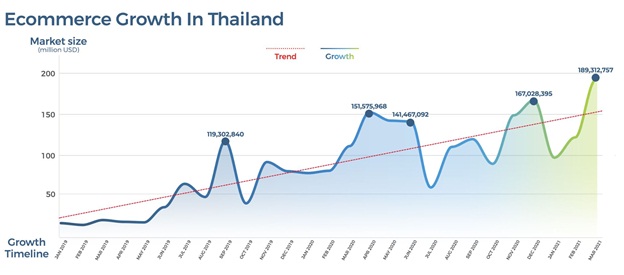Online shopping was growing steadily in Thailand even before the coronavirus pandemic began. But 2020 saw a massive increase in people ordering everything from groceries to clothing to household supplies online. Although consumer habits are complex and the demand for certain goods shifted with the pandemic, the concerns about shopping in person and the high percentage of people with access to the internet created a significant growth opportunity for online retailers.
As a result, the E-commerce industry demonstrated a tremendous increase in terms of new customer acquisition at around 50% for 2020 vs the previous year. From the beginning of the pandemic, aCommerce saw an approximate 120% increase in new “first-time” customers being added in Q2 2020 compared to the previous year. According to the “eConomy SEA 2020” report by Google, Temasek, and Bain & Company, online shopping in Thailand registered a 40% growth in usage after 2020 lockdowns compared with the pre-COVID numbers. The report also revised its forecast of Thai 2025 Ecommerce sales up from US$18bn to US$24bn – the most significant increase among the ASEAN countries.
Good for brands
Brands that might have been previously cautious of cannibalizing their offline sales by moving entirely online had to re-evaluate their assumptions after physical shutdowns. With consumer demand surging online, companies pivoted to satisfying Ecommerce orders through “direct-to-consumer channels” and invested heavily in branded websites, social commerce, etc. At aCommerce, our sales by brands on direct-to-consumer channels grew over 110% in 2020, substantially faster than on marketplaces (for example, on Shopee and Lazada).
But paradoxically, quarantines have helped alleviate some reservations which consumers may have had previously about shopping online. Moreover, research shows that many people are reluctant to go back to old purchasing habits and say that they wouldn’t feel comfortable shopping in a mall in the near future. This gives companies certain confidence that investment in online channels has long-term prospect potential.
Good for consumers
People who are more motivated than ever to stay home and shop online created the ideal market conditions to fast-track, test, and launch new Ecommerce experiences. With this massive shift to online channels, Thai consumers can now enjoy a better selection of products from all categories — both domestic and international. More goods than ever are available to people in Thailand upcountry and remote locations that offline channels might not serve.
Consumers can now also benefit from more cost-effective access to products and more targeted campaigns, loyalty programs, and discounts that resonate with them. More available data on consumer preferences allows companies to respond to the demand faster and better. All these digital solutions to marketing challenges are cheaper to execute than offline initiatives. Besides, the Ecommerce economy can be scaled up, with the cost-saving eventually brought to consumers.

Good for the economy
Anything that benefits consumers and companies leads to economic growth. Ecommerce development is no exception — it attracts investments that support the expansion of the Thai digital infrastructure. It also reallocates financial resources to more innovative sectors, creating more well-paid jobs in digital infrastructure spheres. This creates a self-reproducing cycle of economic development — the more knowledgeable and skilled people become, the more efficient and productive they get. An innovative and creative workforce with digital expertise will, in turn, push the “new economy” towards lower unemployment rates and higher salaries. And we are not talking only about employment for content creators, graphic designers, or photographers — there are also new jobs in logistics, delivery, and customer service.
Ecommerce has the potential to overcome market barriers and connect consumers and businesses. According to The World Bank, Ecommerce can create jobs directly and through logistics services and other parts of the broader E-commerce ecosystem. It also helps in improving household consumption and reduces inequality by bringing to people in rural areas the convenience, variety, and low prices enjoyed by urban dwellers, and contributes to economic growth by lowering the asymmetry of information and increasing economic efficiency. For example, China, where rural villages are heavily engaged in E-commerce, is an excellent example of how developing countries can harness digital technology to create jobs and improve people’s lives. China is the world’s leader in terms of E-commerce penetration and sophistication of digital infrastructure, and its experience confirms that there is a positive correlation between GDP growth and E-commerce growth.
Making it all work
At aCommerce, we specialize in supporting Thai companies (such as AIS, DoHome, TheMallGroup, Osotpa, Naraya, DSG, and GQ) and homegrown businesses, helping them reach more consumers and flourish. As we do this we are also contributing to the Thai economy both directly and indirectly. Our company employs over 500 people in Thailand, with 30% being highly skilled in IT and engineering. And our staff is only getting better because we believe in actively investing in our people and providing them with further training opportunities to grow with us.
Although it is impossible to predict the future of any industry with absolute certainty, we are optimistic about the future of Ecommerce in Thailand. This industry is one of the more resilient locally and globally. It’s also being relied upon more, rather than less, during the current crisis. As such, E-commerce plays a vital role in bolstering the Thai economy, which has been hit so severely by the pandemic, particularly in the tourism and the retail sector.
By Paul Srivorakul, Group CEO of aCommerce

